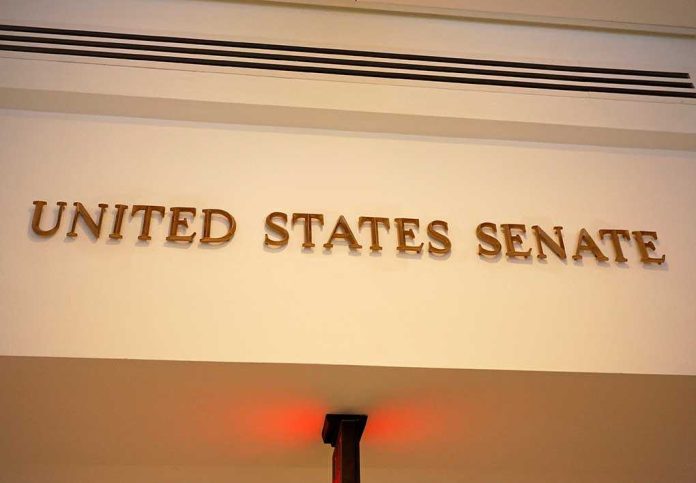
Democrats’ procedural blockade has left hundreds of Trump’s nominees—and the nation’s core conservative agenda—in limbo, prompting Senate Republicans to push for historic rule changes that could reshape the confirmation process and restore effective government.
Story Snapshot
- Senate Democrats have stalled confirmation of hundreds of Trump nominees, even for routine roles.
- Republicans respond with a plan for en bloc voting to speed confirmations and break the backlog.
- The standoff exposes what GOP leaders call Democratic hypocrisy on Senate efficiency and minority rights.
- Rule changes could have long-term effects on Senate traditions, minority leverage, and agency effectiveness.
Democratic Obstruction and GOP Frustration Reach New Highs
Senate Democrats have used procedural tactics to delay confirmation of President Trump’s executive and judicial nominees throughout 2025. Even for non-controversial candidates, Democrats have demanded full debate and roll-call votes, resulting in a historic backlog of unfilled positions. Republicans, holding the Senate majority but lacking a filibuster-proof supermajority, argue that these tactics are not only unprecedented but threaten the efficiency of the federal government and hinder the Trump administration’s ability to advance its agenda. The confirmation delays touch roles vital to national security, economic oversight, and government functionality.
Republican leaders point to a double standard, citing Democrats’ past calls for efficiency and streamlined confirmations when in power. Now, as the minority, Democrats leverage Senate rules to slow Trump’s appointees, a move GOP senators describe as pure obstructionism. This dynamic has bred deep frustration among conservative voters who see their policy priorities—border security, deregulation, and constitutional rights—stalled by what they view as partisan gamesmanship. The situation has become a focal point for broader concerns about government dysfunction and erosion of traditional norms.
Republican Rule Change Proposals: En Bloc Voting and Beyond
To counter the blockade, Senate Republicans have unveiled plans to overhaul confirmation procedures, with en bloc voting at the center. This method allows groups of nominees to be confirmed simultaneously—an approach previously limited in scope and use. The GOP proposal would remove numerical caps, potentially expediting hundreds of appointments that have languished under Democratic delays. Discussions also continue about applying these reforms to judicial nominees and whether further actions, such as reducing debate time or using recess appointments, are warranted. Republican unity on this issue signals their intent to deliver on key Trump administration objectives by restoring functionality to federal agencies and the courts.
Democratic leaders, led by Senator Chuck Schumer, argue that rigorous scrutiny is necessary, especially given the stakes of Trump’s appointments. They warn that weakening minority protections in the Senate could undermine the institution’s traditions and lead to even greater partisanship. Despite these warnings, GOP senators—supported by conservative grassroots—contend that the current level of obstruction leaves no alternative but reform. The debate underscores differing visions of Senate responsibility: one focused on efficiency and executive prerogative, the other on oversight and minority input.
Backlog Impact: Agencies, Public Services, and Political Fallout
With only 98 nominees confirmed after 200 days of Trump’s second term—far fewer than historical averages—key agencies continue to face leadership gaps. This disrupts federal operations ranging from law enforcement to regulatory oversight, affecting both public trust and the delivery of essential services. For nominees, prolonged uncertainty impacts careers and families. Conservatives warn that such gridlock is not merely a procedural inconvenience but a direct threat to the implementation of voter-backed policies on immigration, economic growth, and traditional values. The long-term risk is the normalization of obstruction, further eroding faith in government institutions.
The proposed rule changes could set a new precedent, weakening the minority party’s leverage for years to come. While some experts caution about the erosion of Senate norms, others acknowledge that escalating partisanship has made such reforms inevitable. Republican senators emphasize that their actions are a response to extraordinary obstruction, not a first strike. As these changes unfold, the balance between legislative efficiency and minority rights will remain a defining issue for the Senate and the country at large.
Look at this news article from The Daily Caller: EXCLUSIVE: John Barrasso Exposes Dem Hypocrisy On Unprecedented Blockade Of Trump Nominees. https://t.co/qMQGli1Ee2
— Mike (@gupdiver) September 10, 2025
Senate Republicans’ push for en bloc voting and related reforms highlights a broader conservative concern: the need to defend the Constitution, uphold the will of the voters, and prevent leftist gridlock from undermining effective governance. The outcome will not only determine the fate of Trump’s nominees but could reshape the rules of American democracy for future generations.
Sources:
Senate Republicans Hatch Plan to Confirm Hundreds of Trump Nominees
Senate Republicans plan rule changes to confirm Trump nominees
The Senate confirmation process after 200 days of the second Trump administration












